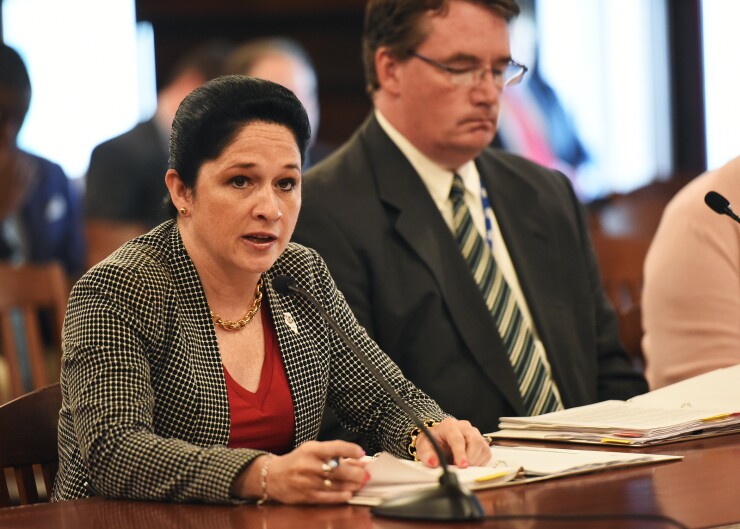A dwindling backlog of unpaid bills and budget proposals that bolster a meager rainy day fund and supplement pension contributions support Illinois’ case for rating upgrades, Comptroller Susana Mendoza argues
“I believe Illinois is due to be recognized for our current achievements and plans to further strengthen our financial situation, and I believe these are strong indicators that favor upgrading Illinois’ credit rating,” Mendoza’s letter says.
Illinois has the lowest ratings of any state: Baa2 from Moody's Investors Service, BBB from S&P Global Ratings and BBB-minus from Fitch Ratings.

Mendoza pointed to the early payoff in January of the state’s $2 billion, three-year
Illinois brought down its bill backlog to $3 billion last year and that’s held steady. “That Illinois has held steady in paying its bills should help ease concerns that the reduced backlog amount was just a temporary accomplishment,” Mendoza, whose office manages bill payment, said in the letter to rating agencies.
The backlog hit of high of more than $16.7 billion in 2017 due to the state’s two year budget impasse.
Mendoza then turns her sights to
“As you know, the governor’s plan is aimed at improving the state’s structural budgetary challenges with its group insurance program and state pensions,” Mendoza writes in the Feb. 4 letter, made public Monday, to the lead Illinois analysts at Fitch Ratings, Moody’s Investors Service, and S&P Global Ratings.
Pritzker would also deposit $879 million in the state’s empty rainy day fund.
Mendoza sent a similar pitch to rating agencies in July at the start of the fiscal year providing analysts with an update that came soon after Moody’s Investors Service upgraded the state to Baa2 from Baa3 in June.
S&P Global Ratings followed Moody’s later in the summer by raising the state’s rating to BBB from BBB-minus. Fitch moved its outlook to positive from negative but left the rating at BBB-minus. S&P late last year then moved the state’s outlook to positive. Moody's assigns a stable outlook.
Mendoza also noted the state’s improved market performance as a sign that investors view the state as being on the upswing. The state captured the lowest yield penalties — a 54 basis point spread to the Municipal Market Data’s AAA benchmark on its 10-year — in recent memory
Investors attribute that more to market demand last year for higher yielding paper and the cushion provided by the state’s $8 billion American Rescue Plan Act funding than to a long-term endorsement of the state’s fiscal health.
In the secondary, the state’s 10-year was at a 63 bp spread to AAA at the start of the year. It widened to 68 bp by the end of January and has been as high as 71 bp amid rockier market conditions.
Pritzker's proposed budget last week drew positive remarks from the rating agencies in
“There are some proposals in the executive budget that clearly target the state’s biggest credit challenges,” said Eric Kim, Fitch’s lead analyst on Illinois.
Analysts
While the Pritzker administration labeled its budget balanced, that’s on a cash basis, and analysts said a deeper review is needed before assessing where the budget stands structurally. They also note that the budget's additional pension contributions
Both Pritzker and Mendoza are Democrats who are seeking re-election in November.





